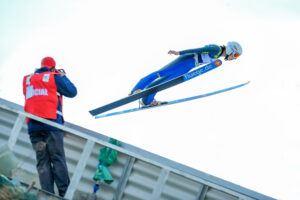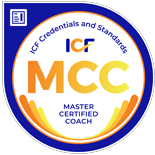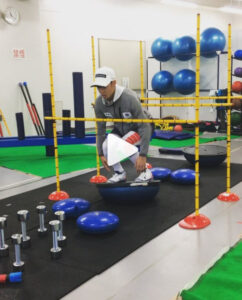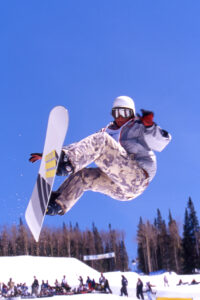 The Winter Olympic Games 2022 have been underway for about 11 days so far, with about 5 days remaining. Every 4 years feels like a treasure chest to me, watching the best athletes in the world compete against each other in their sport including Speed Skating, Snowboarding, Alpine Skiing, Freestyle Skiing, Figure Skating, Cross Country Skiing, and Ski Jumping.
The Winter Olympic Games 2022 have been underway for about 11 days so far, with about 5 days remaining. Every 4 years feels like a treasure chest to me, watching the best athletes in the world compete against each other in their sport including Speed Skating, Snowboarding, Alpine Skiing, Freestyle Skiing, Figure Skating, Cross Country Skiing, and Ski Jumping.
There is no end of inspiration available when hearing the stories of what many of these athletes do to train their physical, mental and emotional capabilities. Watching the athletes compete on their biggest stage in their sport is so informative – about physically being prepared, as well as mentally / emotionally handling the pressure of the moment.
A Professional Coach can learn from how high performance athletes train.
For example, by practicing and preparing between coaching sessions, a Professional Coach can improve their performance in their next  coaching sessions. This involves developing “an ongoing reflective practice to enhance one’s coaching” which is a specific behavior the International Coaching Federation (ICF) names in Core Competency #2: Embodies a Coaching Mindset. This is a daily or weekly practice, not just when engaged in mentor coaching or coaching education.
coaching sessions. This involves developing “an ongoing reflective practice to enhance one’s coaching” which is a specific behavior the International Coaching Federation (ICF) names in Core Competency #2: Embodies a Coaching Mindset. This is a daily or weekly practice, not just when engaged in mentor coaching or coaching education.
Below are some thoughts about engaging from the mindset of a high performance athlete.
Connect with Your Motivation to Improve
Without a good enough reason to improve, most of us don’t engage in improving! What motivates you to become better, as a coach?
As a trained Professional Coach since 1998, my initial motivation to improve my coaching capabilities was based on hearing about the Path of Development ICF offers, which is from beginner (ACC) to intermediate (PCC) to mastery (MCC) coaching skill level. I embraced that path as a way for me to measure my progress toward ever higher coaching competence.
Throughout my life, Learning and Excellence are Values that motivate me to continue to improve. This meant I never intended to stop at attaining the PCC credential; I was always going to keep learning and become “more excellent” as a coach.
 I attained the MCC credential 6 years after beginning my first professional coaching training program. The journey continues as I Learn more and explore the next level of Excellence in my beloved chosen profession.
I attained the MCC credential 6 years after beginning my first professional coaching training program. The journey continues as I Learn more and explore the next level of Excellence in my beloved chosen profession.
My motivation was (and still is) to be the very best coach I can be, which starts with me being the very best person I can be (by my standards). Even if my clients are already satisfied with their coaching results working with me, my assumption is I can always get better, and as a result, support my coaching clients to receive even better, more transformational results.
Examine Self-Talk
Self-talk is what we say to ourself every moment of the day, that voice we hear in our head, the one that is now saying to you, “What voice?” 😊
A high performance athlete has learned to challenge their less supportive self-talk and replace it with something more positive. This is not an affirmation (which are usually “I am” statements) but more a truth you feel you can live in to.
For example, the self-talk of one athlete might be, “It’s going to be hard for me to win a medal at the Olympic Games.” Another athlete might say, “I’m going to train to win the gold medal because it’s possible for me on any given day.” The latter self-talk is a more supportive statement that is also true as we see athletes win all the time who weren’t the favorite.
Coaches can use this same approach with their coaching presence and upgrading their coaching skills. For example, by saying, “I’m going to be the most present I can be in this next coaching session.” Or “I’m going to keep learning along my Path of Development until I’m awarded the MCC credential, no matter how long it takes because the journey will grow me as a person and a professional.”
Study Film
Successful athletes are constantly engaged from a mindset of improving, as margins between being a really good athlete and an Olympic caliber athlete may be measured in the difference of a few points, hundredths or thousandths of seconds.
 To be ready to perform at their highest level, a Professional Athlete will study video (film) of their performance, and some can even do this almost in real time. For example, I live in California in the United States, where National Football League (NFL) athletes can be seen on the sidelines during a game and between plays, studying what they see on a computer tablet that has immediate video of plays that just went well, or went wrong. They are learning and adapting as close to real-time as possible.
To be ready to perform at their highest level, a Professional Athlete will study video (film) of their performance, and some can even do this almost in real time. For example, I live in California in the United States, where National Football League (NFL) athletes can be seen on the sidelines during a game and between plays, studying what they see on a computer tablet that has immediate video of plays that just went well, or went wrong. They are learning and adapting as close to real-time as possible.
As an aside, the Grand Final of the NFL was a few days ago in Los Angeles, with the Los Angeles Rams defeating the Cincinnati Bengals. Another privilege to watch high performance athletes giving their best so they could win their sports biggest honor.
Athletes at the top of their sport, regularly engage in watching film between sessions, making it part of their daily/weekly routine to watch, examine, learn and improve their skills.
Gym Work for Coaches
Following on from studying film, coaches can become better at training outside of coaching sessions, such as to increase their ability to craft customized questions in the moment within coaching sessions. The same for how to offer a comment or observation where the coach practices saying what they would have liked to say to a client. 
One practice is to regularly (daily, weekly) craft questions between coaching sessions. To “get into the gym” and exercise ability to use client words, client metaphors or client visual language to craft possible questions you might have liked to ask the client.
The client might use certain words, metaphor or other non-verbal language (body or facial expression) and in the moment, I couldn’t think of what to ask or say. I’ll make a note of key words the client used, or what I observed, and after the session will practice crafting responses, either as questions I would have liked to have asked, or an observation I might have offered. I’m building my capacity to be more agile in-the-moment in next coaching sessions.
For examples, you may want to revisit an article I wrote, How to use a transcript to improve your coaching performance.
Cross Train
 A Professional Athlete doesn’t just compete at an event. They constantly practice and prepare prior to an event by participating in strength workouts, skills development, nutritional eating, self-care practices, as well as psychology sessions to ensure their self-talk aligns with their intentions to be their best.
A Professional Athlete doesn’t just compete at an event. They constantly practice and prepare prior to an event by participating in strength workouts, skills development, nutritional eating, self-care practices, as well as psychology sessions to ensure their self-talk aligns with their intentions to be their best.
They may also cross train to build their strength, endurance and flexibility engaging in activities that may not be directly related to their sport. Cross-training activities can be fun, challenging and keep the athlete motivated.
For example, at the 2022 Winter Olympics, 25 year old Ryoyu Kobayshi became the first Japanese ski jumper to win an Olympic gold medal on the normal hill since 1972. An old 2017 Instagram post (ryo_koba) has surfaced showing him participating in an obstacle course of hurdles, balls, balance boards, and weight-walking. You can search for “kobayashi ryoyu workout routine” to find the viral video. The photo is a screen shot of the beginning of Ryoyu’s cross-training course.
“Skateboarding is training, but I don’t think of it as training. It’s fun.” ~ Shaun White (3 time Olympic Gold Medalist in Snowboarding Halfpipe)
Professional Coaches use this principle too, recognizing they can cross-train in many life situations. 
- Consider participating in an Improvisation (Improv) Course at your local Performing Arts Center, to learn how to respond in the moment to whatever scenario is presented.
- Consider your whole life a playground in how to listen, observe, and learn. For example, listen to a piece of unfamiliar music and notice which instruments, words, melodies, or harmonies stand out to you. Also the subtle or overt shifts in energy, and the emotional connection you feel, or don’t feel. This type of cross-training can expand and sensitize your listening abilities when you are coaching.
- Walk in nature, or even in your home area, as if for the first time. Pay deep attention to what your senses are hearing, seeing, smelling, feeling. What is unexpected in your surroundings? What might you now see or experience differently?
Repetition, Over-Learning and Over Training
The way to free up more brain energy is to practice a new skill until it becomes an automatic habit. Rehearsing, and Repetition are key.
If you keep practicing the art of crafting customized questions, or succinct observations, to a point of over-learning or over training, you move the skill from taking up a lot of brain energy, to far less brain energy required. This is where you observe someone doing something effortlessly at a high skill level; most often that just didn’t happen. There was motivation, studying film, training, cross training, learning from mistakes, training some more, and so on.
In Closing…
 How might you train like an Olympic Athlete?
How might you train like an Olympic Athlete?
Consider engaging daily or weekly reflective practice to form a habit of reflecting on what happened in a coaching session, and what you could have improve in your presence, and skills. Practice writing out and speaking out questions you would have loved to ask yet didn’t have the words in the moment. Practice saying comments or observations you would have liked to have said in the moment.
Engage with a Qualified Mentor Coach who can support in your reflective practices, further develop your presence, and increase your coaching skill competence. There are very few (none?) professional athletes that get to the pinnacle of their sport without having mentors, coaches, or input from trained professionals that can support their learning and development.
Written by Carly Anderson, MCC
Are you ready to upgrade your coaching skills, and prepare for your next ICF credential?
The Mentor Coaching Group Program is an ICF approved individual / group program with 24 Core Competency CCEs on offer, including 10 hours of mentor coaching.
New Mentoring Programs Now Open!
Group #62 PCC-ACC mentoring program commences April 11, 2022 (7 places remain)
Group #63 MCC mentoring program commences April 12, 2022 (2 places remain)
 I offer a rich, experiential mentor coaching group and individual program that has many exclusive offerings for participants. You can read some testimonials from real people, FAQs, or find out more about The Mentor Coaching Program here
I offer a rich, experiential mentor coaching group and individual program that has many exclusive offerings for participants. You can read some testimonials from real people, FAQs, or find out more about The Mentor Coaching Program here
I’m a long term (since 2005), experienced and active MCC Assessor. I’ve been trained by the ICF to assess using the PCC Markers. Since 2005, I regularly assess for ICF MCC, PCC and ACC credentials, and was one of 15 coaches on the core global team involved in the 2020 update of the PCC Markers to align with the ICF Updated Core Competency Model.
One of the unique offerings for my clients is access to an extensive, exclusive library of MCC, PCC and ACC coaching session recordings, many of which have passed the ICF credential exam process. These are an incredibly valuable self-learning tool, and will accelerate your understanding of competency distinctions at each skill level.
I offer other products including The Upgraded Target Approach: Clarifying the ICF Core Competency Model, as well as Ten Characteristics of MCC Skill Level. And a very unique opportunity to hear 15 consecutive coaching sessions with one of my clients in the Butterfly on the Wall Coaching Series. You can learn more about these here
